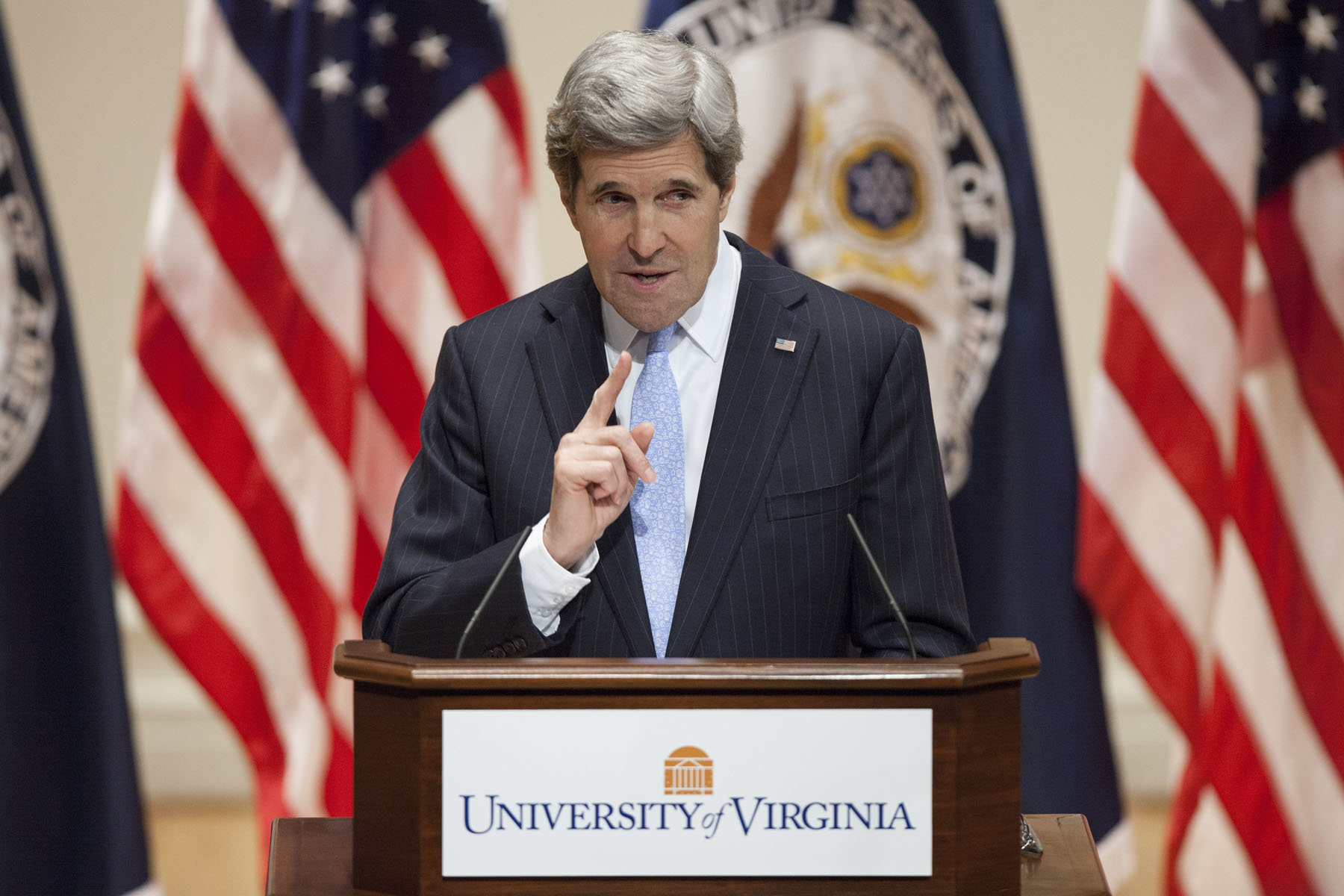U.S. Secretary of State John Kerry used an appearance Wednesday at the University of Virginia to make a forceful case for foreign aid and a strong U.S. diplomatic presence in the world.
The address was Kerry’s first major policy speech since taking office at the beginning of the month, and he chose U.Va. as his venue in part because University founder Thomas Jefferson served as the nation’s first secretary of state.
U.Va. President Teresa A. Sullivan introduced Kerry, and linked his visit to Grounds with past visits by national leaders, including a 1940 address by Franklin D. Roosevelt and a 1989 “education summit” of the nation’s governors convened by George H.W. Bush.
“Today, continuing in this tradition, Secretary of State John Kerry will speak about the importance of effective American foreign policy and diplomacy,” Sullivan said.
Kerry characterized foreign aid and diplomacy as necessary investments that lead to greater worldwide stability and help develop future commercial markets for U.S. interests. He also explained why he chose a domestic audience for his first major speech in office.
“Why is it that I’m at the foot of the Blue Ridge instead of on the shores of the Black Sea? Why I am in Old Cabell Hall and not Kabul, Afghanistan?” Kerry said. “The reason is very simple. I came here purposefully to underscore that in today’s global world, there is no longer anything ‘foreign’ about foreign policy. More than ever before, the decisions we make from the safety of our shores don’t just ripple outward, they also create currents right here in America.”
Globalization means the country’s foreign policy affects domestic life more than ever, Kerry said. International challenges in diplomacy, development, economic security, environmental security and other areas are immediately felt at home, he said.
“Our challenge is to tame the worst impulses of globalization even as we harness its ability to spread information and possibly, to offer even the most remote place on Earth the same choices that have made us strong and free,” he said.
Though a recent poll showed that many Americans believe international spending constitutes as much as 25 percent of the federal budget, the true number is just over 1 percent, Kerry said. This hasn’t made it any less of a target for potential spending cuts, especially in lean times, he said.
“Every time that a tough fiscal choice looms, the easiest place to point fingers? Foreign aid,” he said. “As Ronald Reagan said, foreign aid suffers from a lack of domestic constituency, and that’s part of the reason that everyone thinks it costs a lot more than it really does.”
However, drastic cuts in foreign investment could harm the ability of American businesses to expand into foreign market, he said. Eleven of the country’s top 15 trading partners have been beneficiaries of U.S. foreign assistance, including Japan and Germany, which would have seemed unlikely in the years following World War II, he said.
“When Jefferson expanded our consular posts precisely to promote trade, he never could have imagined the importance today,” Kerry said. “Nor could he have predicted the number of Americans abroad that we help with their passports, with visas, with other problems that arise.”
Kerry, a longtime Massachusetts senator and one-time Democratic presidential nominee, said he’s keenly aware that the greatest challenge to U.S. foreign policy isn’t diplomatic, but political.
“It is often said that we cannot be strong at home if we’re not strong in the world, but in these days of a looming budget sequester that everyone actually wants to avoid – or most – we can’t be strong in the world unless we are strong at home,” he said.
In the years following World War II, the U.S. had the opportunity to turn inward and recover from years of war. Instead, the federal government enacted the Marshall Plan, which involved a major investment in rebuilding war-ravaged Europe, he said.
“After the war, my friends, we didn’t spike the football; we created a more level playing field, and we are stronger for it today,” Kerry said.
The secretary of state also said the U.S. should be a global leader in a fight against climate change, and reiterated that full economic recovery in the U.S. requires investment in foreign countries that could develop into future markets for domestic companies.
“Let me be very clear: Foreign assistance is not a giveaway. It’s not charity. It is an investment in a strong America and in a free world,” he said.
Kerry also dropped a few University shibboleths into his address, which seemed to please the home crowd.
“I just feasted on the view as I walked across the Lawn with President Sullivan, and I have to say, you all are very lucky to go to school here. It is an honor to join you here on Grounds,” Kerry said, getting a brief ovation for correctly using U.Va.’s term for what everyone else calls a campus. “It’s a very beautiful monument to the potential of the human mind.”
Afterward, second-year student Erick Chiroles and third-years Alex Preve and Carrie Caps stood outside Old Cabell Hall. All three received tickets to see Kerry through a lottery system set up to allocate seats. Chiroles said he found the address extremely motivational.
“He makes the point that foreign relations are important, not just in the present, but for the future,” he said. “Foreign aid isn’t a handout, it’s an investment.”
Preve said he appreciated that Kerry drove home the danger that failed budget negotiations in Washington present to the country’s foreign affairs priorities.
All three approved of Kerry’s use of the terms “Grounds” “Lawn” and “first-years.”
“You can tell he really did his homework,” Capps said.
Media Contact
Article Information
February 20, 2013
/content/secretary-state-foreign-aid-isn-t-charity-it-s-investment

